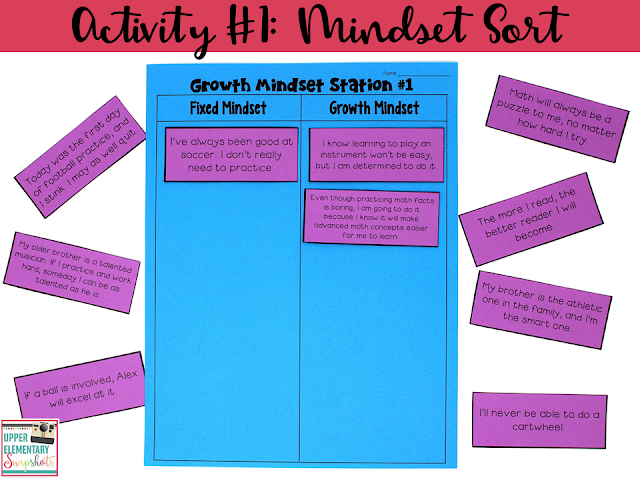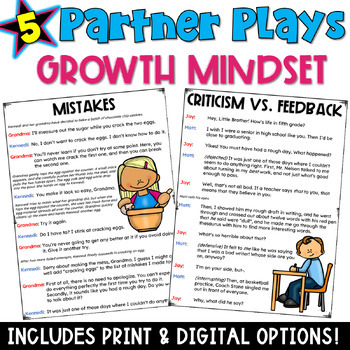Growth mindset… it’s one of my favorite movements to sweep across the education world in recent years. After reading Mindsets in the Classroom: Building a Culture of Success and Student Achievement in Schools by Mary Cay Ricci, I decided to create a Growth MindsetPowerPoint and a set of partner plays. When I finished those items, I thought I was done creating for this concept. However, I was recently inspired to create some growth mindset stations, and make them available for free to our blog readers. (Exciting update: I converted these activities to Google Slides. You can now choose between the printable version and the digital version!)
Growth Mindset Station #1: Fixed Mindset vs. Growth Mindset
Fostering a growth mindset begins with teaching students the difference between having a fixed mindset and a growth mindset. With this activity, students read each statement and determine which category it fits with most closely.Growth Mindset Station #2: How the Brain Builds Pathways
This station is based upon what researchers have discovered about how our
brains operate. Researchers have discovered that when we learn a new skill or
piece of information, pathways are created in our brain between neurons. These
pathways are weak at first, but become stronger as we repeat and practice the
skill. To show how these pathways become thicker and stronger with repeated practice, I created the
following visual. Students begin by using a colored pencil or marker to color
the neurons shown in each brain. Students then glue (or tape) thread on the
first image, ribbon on the second image, and then yarn and rope (or chord) on the
last two images to connect the neurons.
Dealing with mistakes and failures in the most positive way
possible is the focus of this second station. Students read the scenarios on
the two cards. At the bottom of each card, students are instructed to write
about the event from the perspective of a person with a fixed mindset in the
first speech bubble on their worksheet, and to write about the event from the
perspective of a person with a growth mindset in the second speech bubble.
As we teachers know, positive
self-talk is powerful. A few upper elementary students do this
automatically… it’s simply how they think. Many students, however, need to
train their brain regarding positive self-talk. Negative self-talk happens all
too easily. Replacing that negative self-talk with positive self-talk is the
focus of this station. Students simply replace the negative statements shown in
the left column by writing positive statements in the right column. If there is
enough time, I also allow my students to cut Xs out of construction paper and
glue them on top of the negative self-talk thought bubbles.
Another thing we teachers know is that the ability of
students to differentiate criticism from
feedback is an ability that will benefit them for the rest of their
lives. When students arrive at this station, they read the scenarios on the two
cards. At the bottom of each card, students are instructed to pretend that they
are talking to the classmate described in the scenario. They are to write what
they would say to help that classmate view the teacher’s (or coach’s) remarks
as feedback rather than criticism.
If you’d like to try using these stations in your classroom,
click HERE to download! Also, be sure to check out Meg's post about growth mindset!
Also, feel free to check out my PowerPoint and partner plays- just click on the images below. These stations would be an excellent
follow-up activity after working through the PowerPoint with your students. The
stations line up with the 5 main topics covered in the PowerPoint. Both of these activities are available in printable and digital versions.










